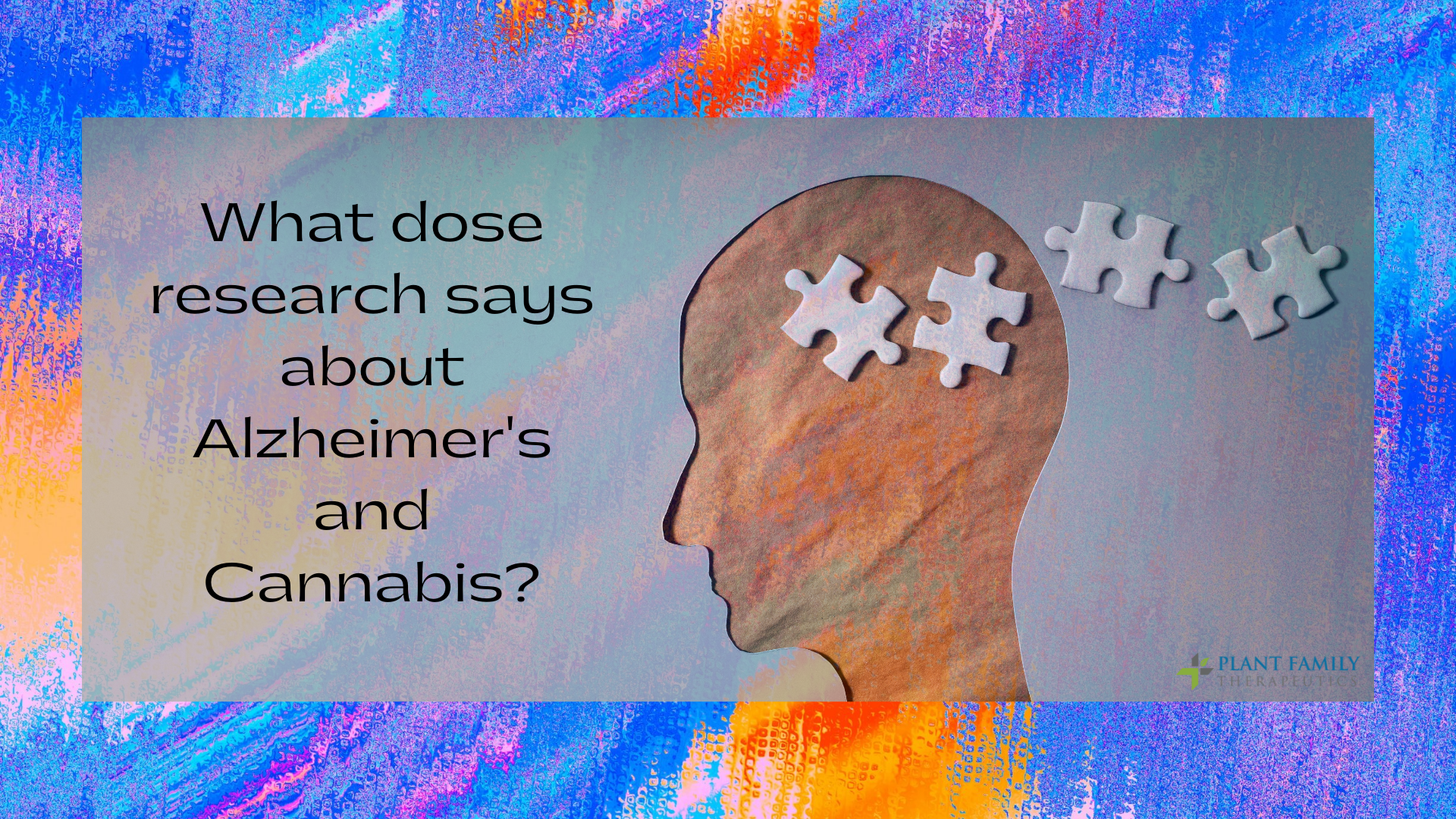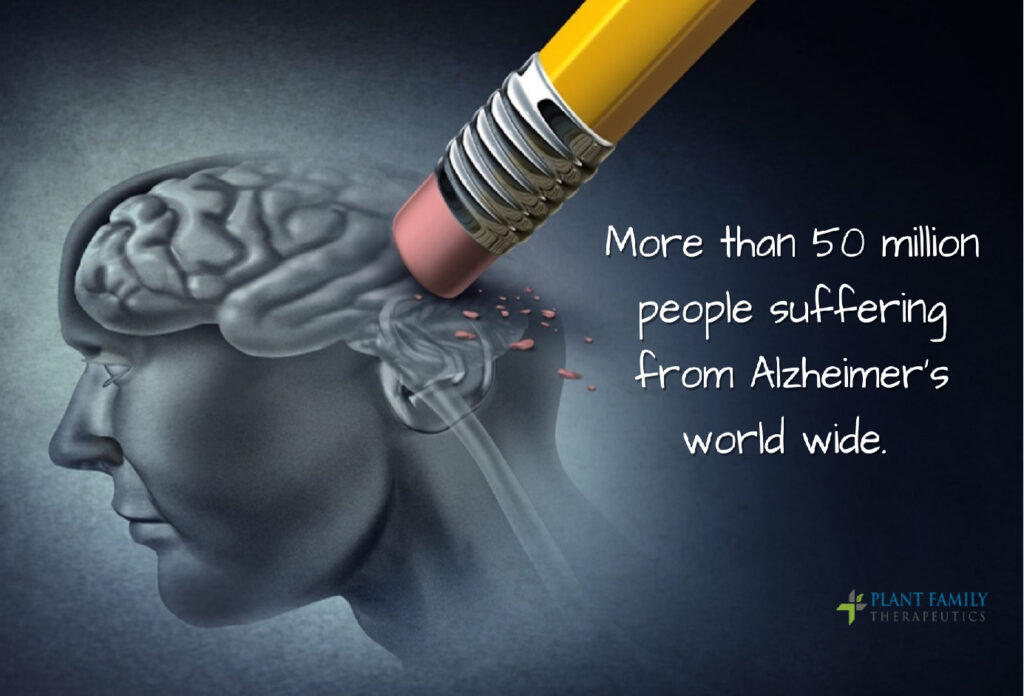This website requires you to be 21 years or older to enter. Please confirm your age below to continue.

What is Alzheimer’s disease?
Many people think that dementia and Alzheimer’s disease (AD) are the same, but they’re not.
Dementia is used to describe a group of symptoms associated with a decline in memory, reasoning, thinking, communication abilities, and the performance of daily activities.
Alzheimer’s is a degenerative brain disease caused by complex brain changes from plaque damage which leads to dementia symptoms that worsen over time. Scientifically, the neuropathological hallmarks of AD are extracellular accumulations of proteins amyloid-beta (Aβ) as well as intracellular accumulations of neurofibrillary tangles (NFTs) that are comprised of hyperphosphorylation of tau. Advanced symptoms include disorientation, confusion, aggressive, and behavioral changes, eventually progressing to difficulty with speaking, swallowing, and walking.
Though the greatest known risk factor for Alzheimer’s is increasing age, the disease is not a normal part of aging. Currently, it is estimated that more than 50 million people are suffering from Alzheimer’s worldwide and though most people with AD are 65 and older, approximately 200,000 Americans under 65 are living with younger-onset Alzheimer’s disease.
Treatments for Alzheimer’s
Currently, there is no cure for Alzheimer’s, but research and studies have shown that the removal of a plaque called amyloid from the brain, the hallmark of the disease, is likely to reduce the chances of Alzheimer’s progression.
There is one FDA-approved drug on the market that works to decrease the amount of amyloid plaque forming on the brain. This drug, which is intravenously administered over a 45-to-60-minute period every 4 weeks at the hospital or infusion centers, has a few side effects that include headaches, falls, dizziness, temporary swelling of the brain, possible bleeding in or on the surface of the brain, confusion, and vision changes.
Both CBD and THC show great promise
There are several studies that demonstrate how both CBD and THC can help with symptoms of Alzheimer’s disease. Here is what research currently knows:
CBD, known for its neuroprotective, anti-inflammatory, and antioxidant properties, is shown to be useful in decreasing negative behavioral and psychological symptoms, including memory loss, aggressive behavior, sleep disturbance, social withdrawal, and lost inhibitions. Studies demonstrated that CBD has the ability to promote neurogenesis (the process which new neurons are formed in the brain) and prevent the development of cognitive defects in Alzheimer’s disease.
In a study released in 2021 by the National Library of Medicine, researchers say CBD has real potential in helping to curb cognitive decline and alleviate some Alzheimer’s symptoms through changing the chemistry in the brain. The authors reported that the proteins (that cause the plaque formation) were affected by CBD in a way that helped brain cell communication.
THC is the primary psychoactive component found in cannabis. When used correctly, THC has powerful therapeutic effects for the treatment of neuronal inflammation and neurodegenerative conditions such as Alzheimer’s disease. THC shows a broad spectrum of effects in either blocking or preventing the formation of amyloid plaques. THC also inhibits the enzyme acetylcholinesterase (AChE) better than the approved drugs donepezil and tacrine for AD

treatment. The toxicity induced by high levels of glutamate (which contribute to the disease) were also inhibited by THC.
Studies have shown that THC has a significant positive response on neurobehavioral symptoms including delusions, agitation and aggression, irritability, rigidity or stiffness, and sleep.
It is important to understand the difference between medical and recreational use here. Chronic overuse or higher amounts than necessary of THC can bring on or exacerbate psychosis and or cause adverse effects such as a reduction in cognitive functions, learning, memory, attention, and possibly affect your dopamine release, which can affect your mood, motor control, motivation, pleasure and more. Low-dose THC is best for cognitive conditions.
Chronic pain is associated with cognitive dysfunctions, including AD. Both CBD and THC were shown to stop or reduce pain and rigidity. Several studies found that CBD and THC were very well tolerated, improved behavior overall, and allowed the decreases or stopping of psychotropic medications.
THC and CBD were found to work better when taken together on symptoms and, in some cases, showed improved memory impairment. Studies found positive outcomes with natural cannabis extract, using a THC/CBD ratio of 1:2 ranging from 2mg THC/4mg CBD up to 17mg THC/34mg CBD daily dosage.
Conclusion
While small-scale clinical trials have produced encouraging results from both CBD and THC, the time has come for extensive, large-scale clinical trials. Several organizations throughout the world are prepared to conduct these studies, which will offer a much clearer picture of how cannabis compounds affect the development and progression of Alzheimer’s disease in humans.
These and future clinical trials may indicate which cannabis compounds are most beneficial in the treatment of dementia, resulting in more effective treatments tailored to the specific challenges that Alzheimer’s disease presents.
References
Abate, G., Uberti, D., & Tambaro, S. (2021). Potential and Limits of Cannabinoids in Alzheimer’s Disease Therapy. Biology, 10(6), 542. https://doi.org/10.3390/biology10060542
Broers, B., Pata, Z., Mina, A., Wampfler, J., de Saussure, C., & Pautex, S. (2019). Prescription of a THC/CBD-based medication with Dementia: A pilot study in Geneva. Med Cannabis Cannabinoids.2019;56-59 DOI: 10.1159/000498924
Cao, C., Li, Y., Liu, H., Bai, G., Mayl, J., Lin, X., Sutherland, K., Nabar, N., & Cai, J. (2014). The potential therapeutic effects of THC on Alzheimer’s disease. Journal of Alzheimer’s disease : JAD, 42(3), 973–984. https://doi.org/10.3233/JAD-140093
Eubanks, L. M., Rogers, C. J., Beuscher, A. E., 4th, Koob, G. F., Olson, A. J., Dickerson, T. J., & Janda, K. D. (2006). A molecular link between the active component of marijuana and Alzheimer’s disease pathology. Molecular pharmaceutics, 3(6), 773–777. https://doi.org/10.1021/mp060066m
Khodadadi, H., Salles, É. L., Jarrahi, A., Costigliola, V., Khan, M. B., Yu, J. C., Morgan, J. C., Hess, D. C., Vaibhav, K., Dhandapani, K. M., & Baban, B. (2021). Cannabidiol Ameliorates Cognitive Function via Regulation of IL-33 and TREM2 Upregulation in a Murine Model of Alzheimer’s Disease. Journal of Alzheimer’s disease : JAD, 80(3), 973–977. https://doi.org/10.3233/JAD-210026
Kim, S. H., Yang, J. W., Kim, K. H., Kim, J. U., & Yook, T. H. (2019). A Review on Studies of Marijuana for Alzheimer’s Disease – Focusing on CBD, THC. Journal of pharmacopuncture, 22(4), 225–230. https://doi.org/10.3831/KPI.2019.22.030
Mukhopadhyay, S., & Banerjee, D. (2021). A Primer on the Evolution of Aducanumab: The First Antibody Approved for Treatment of Alzheimer’s Disease. Journal of Alzheimer’s disease : JAD, 83(4), 1537–1552. https://doi.org/10.3233/JAD-215065
Watt, G., & Karl, T. (2017). In vivo Evidence for Therapeutic Properties of Cannabidiol (CBD) for Alzheimer’s Disease. Frontiers in pharmacology, 8, 20. https://doi.org/10.3389/fphar.2017.00020